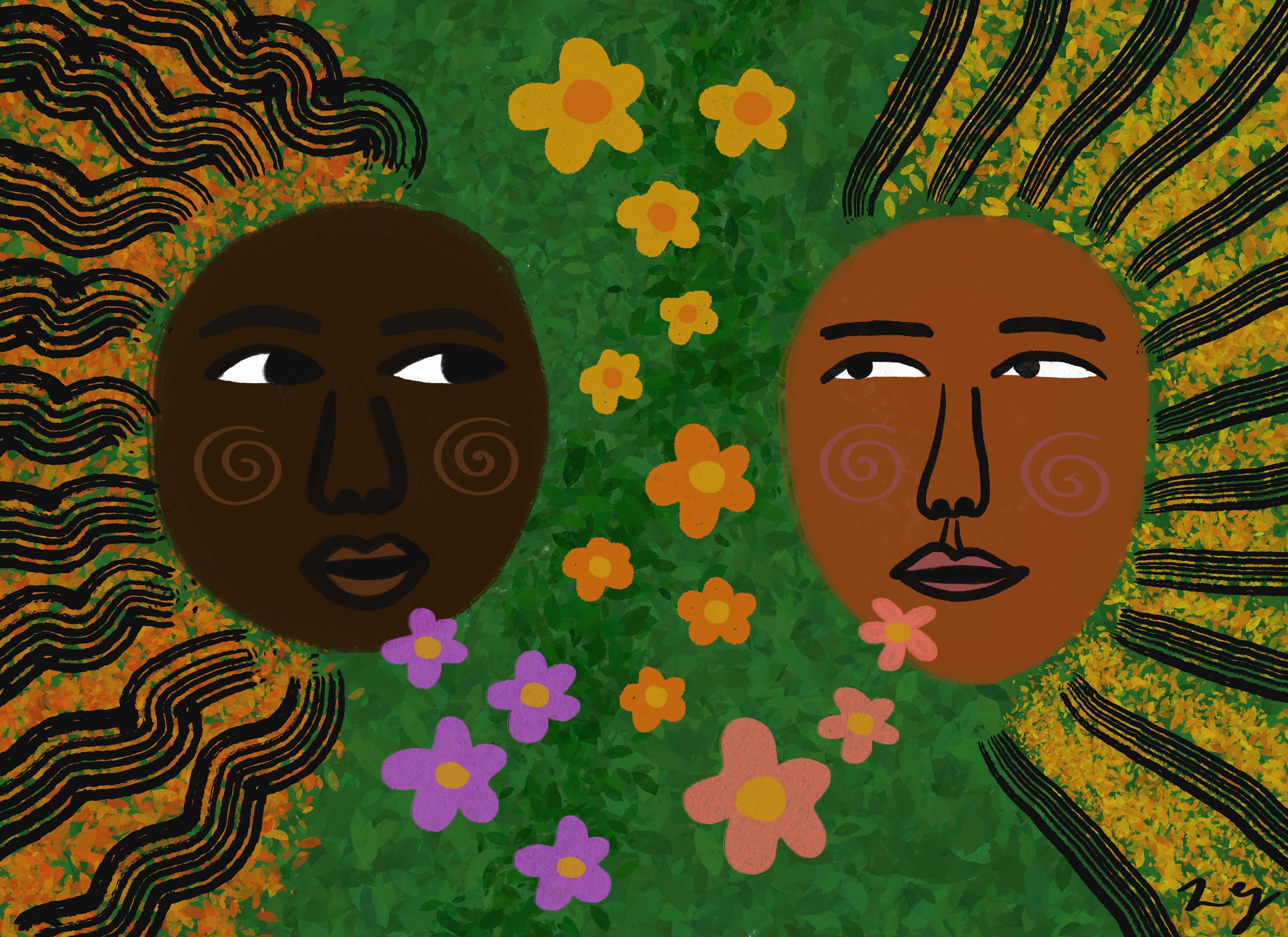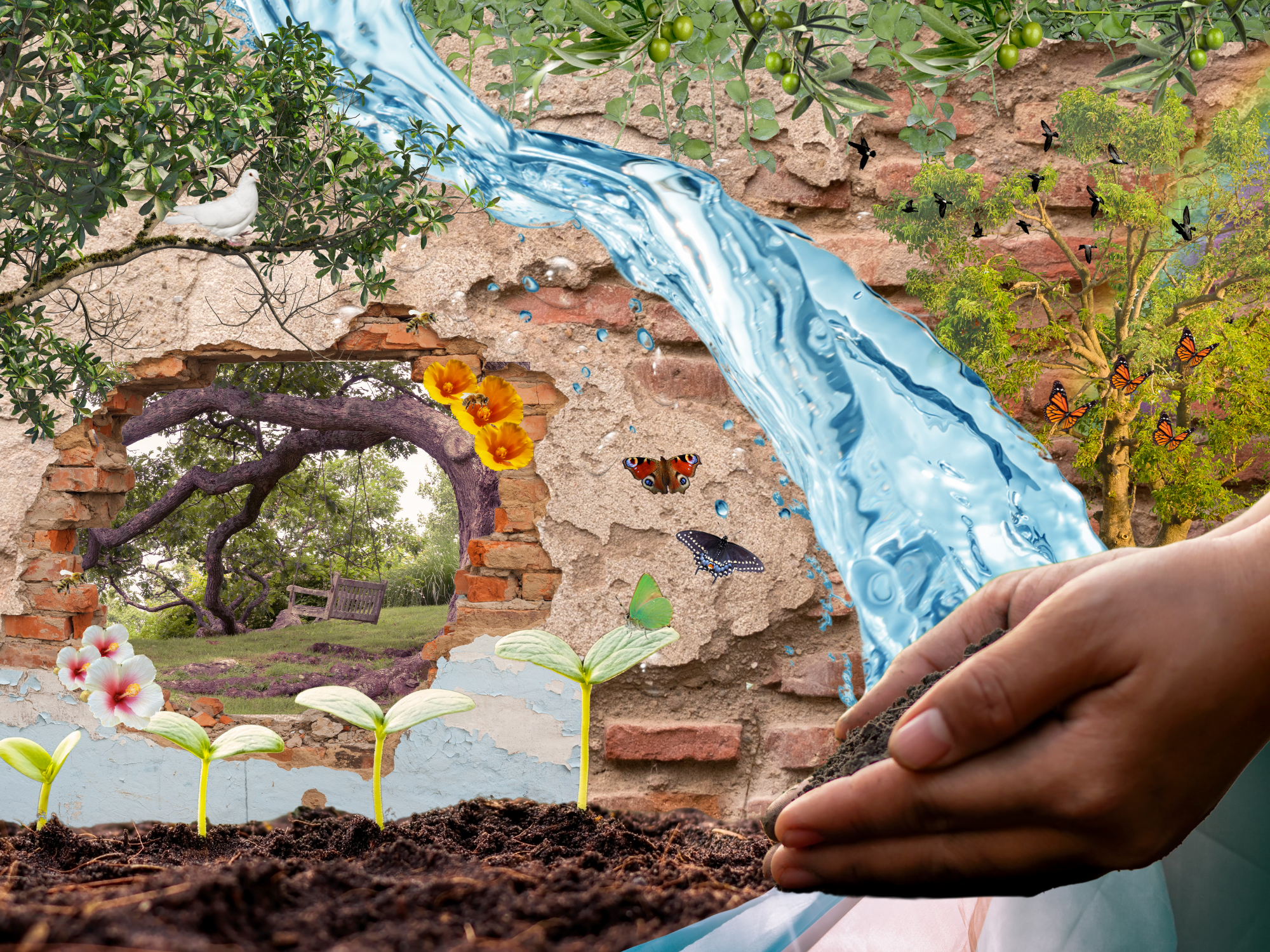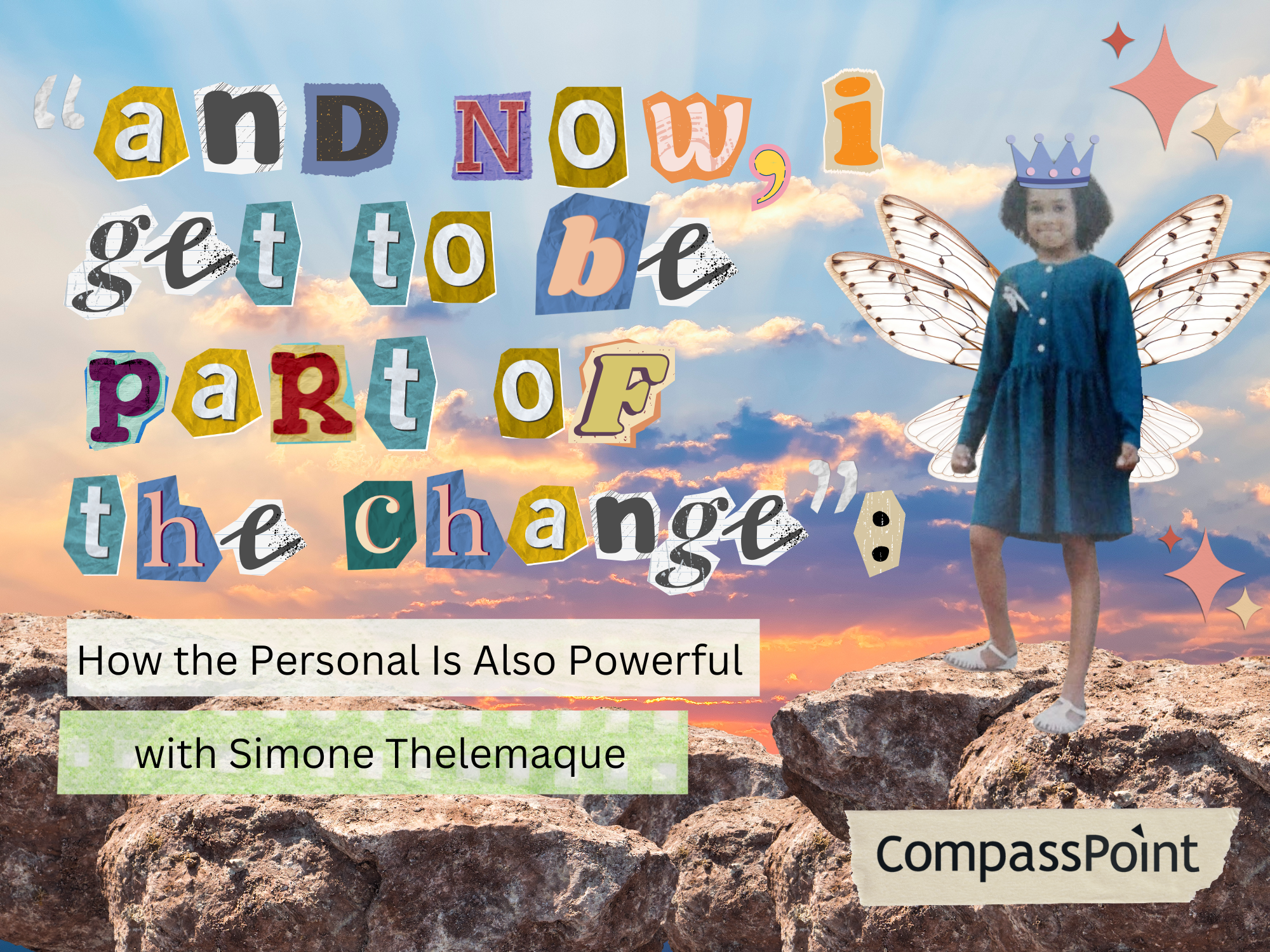[Image description: Two faces, one with a deep rich brown complexion on the left and one with a rust-colored complexion on the right, look towards one other with slightly parted, smiling lips. The left face has thick, curly tendrils of dark hair fanning out from their head and into the left corners of the image, with tiny, overlapping orange petals scattered underneath; whereas the right face has thin, slightly wavy tendrils of dark hair fanning out from their head and into the right corners of the image, with tiny, overlapping golden petals scattered underneath. Together they produce a mirrored sun effect. There are purple and pink and yellow flowers spilling from their lips and between them, against a backdrop of green grass.]
Working in organizations and teams means we’ll inevitably have challenging moments where we have to navigate conflict together. Many of us are well versed in naming what parts of conflict we’re “bad” at, but what’s possible when we start from a place of naming our gifts and wisdom instead?
"Conflict is a Garden" Illustration by Learkana Chong
When it comes to navigating interpersonal conflict in our organizations and in movement spaces, many of us are well practiced in naming our own self-described “failures” and calling out where others fall short of our expectations.
What’s possible when we start from a place of naming our gifts and wisdom instead?
In our Conflict Resolution with Power and Privilege in Mind training, one of the ways we ask folks to reflect on their approach to conflict is to think about their conflict superpowers: the skills, perspectives, and wisdom that they believe contribute to a generative approach to dealing with conflict.
Here are a few reflections from the CompassPoint team to get you started. Explore more with us in an upcoming Conflict Resolution with Power and Privilege in Mind training.
Join us for Conflict Resolution with Power and Privilege in Mind or for Conflict Resolution with Power and Privilege in Mind for BIPOC Leaders.
Yasi Safinya-Davies
The truth is, when I’m in an active conflict, it’s challenging to bring my best self to the fore. But when I remember to slow down and listen to the messages of my mind, heart, and body, I am able to recognize that both of us are bringing our lived experiences (and often the experiences of generations) into the circumstance. This shift helps open me up to being vulnerable, compassionate, and genuine in my sharing and in my listening. It also allows me to accept how the discord will resolve; perhaps it strengthens the relationship, maybe I recognize a personal boundary, or it could be that the resolution will have to be my own work. By allowing for spaciousness, conflicts become less worrisome or fearful or overwhelming and I can accept them as a part of living and growing.
Jessy Zapanta
My conflict superpower is the ability to breathe, pause, and check in with myself before responding to a situation: How do I feel in my body? Are the emotions arising reflective of my current reality, or is this an old story—a trauma response? Because so much of interpersonal conflict is rooted in misunderstanding and breakdowns in communication, it’s important for me to be able to discern when I’m seeing a situation clearly versus being clouded with my own baggage. This is definitely an acquired superpower, and one I have done a lot of work to shift toward because, growing up, the default approaches to conflict around me looked like “fight,” “flight,” or “shut down.” It’s an ongoing practice!
Jasmine Hall
One superpower I bring to conflict is active listening. Engaging in conversation to understand another person’s perspective versus finding faults or defending a stance. While I am listening, I’m observing their tone, body language, energy (or lack thereof), and other forms of nonverbal communication to get a deep understanding of how the conflict may be affecting them. Knowing the emotional state of the person I’m in conflict with gives me the information I need to assess if it’s safe to engage and how to move towards repair. Are we in the right head and/or heart space to find a resolution? Do we need time to settle our emotions? How can we tap in with others to help resolve this issue?
Steve Lew
I try to remember and ground myself in an awareness that most (perhaps all) interpersonal conflicts are not just about that person and me, they are also about the conditions and dynamics at work beyond us. If I have a chance to think about what's going on around us (change and transitions for example), it reminds me to be “soft on people, hard on systems.” Having a "senior" status (in tenure, director level, age, and length of time in this work) I need to check myself for dominating thinking and behavior. Do I really know what's best/right in this disagreement or do I just have some of the information? It also goes a long way to know I can apologize and admit mistakes without experiencing shaming and blaming, or acknowledge someone else's perspective without giving up my own.
Simone Thelemaque
In conflict, I try to make space for all types of expression, particularly of strong emotions. My family is loud, emotive, sensitive and full of storytellers. We speak with our bodies, with our hands, the sounds of our voices, or with facial expressions. We may need a moment to pause, walk out of a room and return, or have the spaciousness to feel our feels. I am able to make space for expression when there is a deep trust in one another and a shared belief in our intention to come to a place of repair, acknowledgement, and accountability. It’s easy to tone police or miss the heart of what someone is saying when we’re overly focused on the presentation. I’ve also learned how to remind myself and others when the expressiveness has become disruptive or distracting, harmful, or counterproductive. Long story short, we may not always appear “calm” and that’s okay.
Try it on by yourself, with one other person, or as a team. Start a conversation by asking folks to fill in the blank:
One value I try to hold when dealing with conflict is ______ .
One superpower I bring to active conflicts is ______.
Interested in more time and space to explore conflict resolution skills and approaches? Join us for Conflict Resolution with Power and Privilege in Mind or for Conflict Resolution with Power and Privilege in Mind for BIPOC Leaders.
Other Conflict Resolution Resources to Explore:






Submit a comment